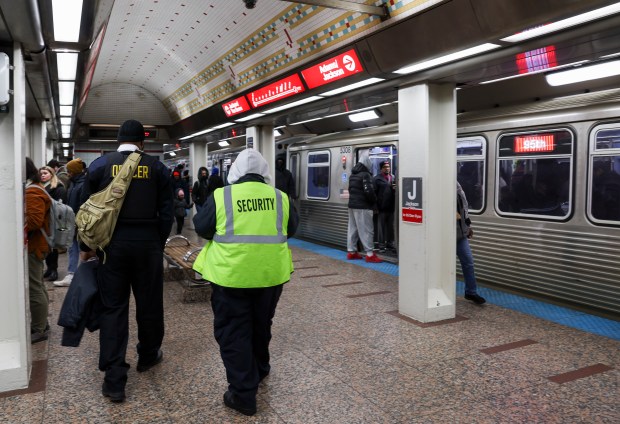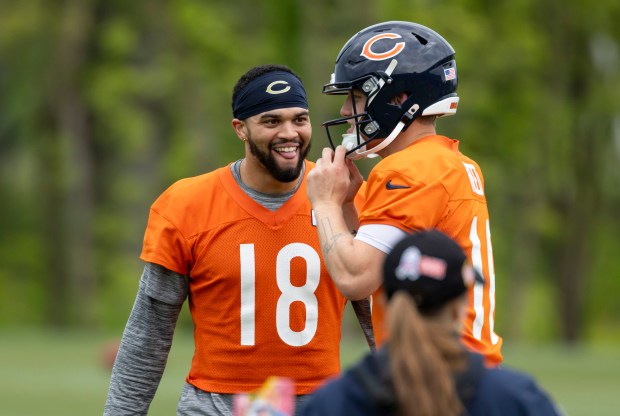After a chaotic mistrial earlier this month, a federal juice loan extortion case with ties to a larger probe of the Chicago Outfit ended Monday when prosecutors announced they were dropping all charges.
Gene “Gino” Cassano, 55, and Gioacchino “Jack” Galione, 47, were indicted in 2021 on charges of conspiring to collect a debt by extortionate means. Galione was also charged with using violence to collect a debt.
The case focused on the Aug. 1, 2016, assault of Luigi Mucerino inside Galione’s garage in Addison, which prosecutors allege was over a $10,000 juice loan Mucerino had taken out from Cassano and failed to pay back.
Defense attorneys admitted to the jury that Galione punched Mucerino in the face that night, breaking his nose and shattering more than a dozen bones in his face. But they denied the assault had anything to do with the collection of the loan — an element that prosecutors had to prove beyond a reasonable doubt.
The madcap trial abruptly ended March 9 after three days of testimony when an FBI agent testified he was assigned to investigate “organized crime,” a term U.S. District Judge Sharon Johnson Coleman had explicitly barred to avoid prejudicing the jury.
The rare decision to scuttle the trial came after days of turmoil as prosecutors were forced to put on a parade of reluctant witnesses to prove their case, including alleged victim himself, an admitted drug trafficker and marijuana abuser who also had to be granted immunity to coerce him to testify.
Coleman granted the U.S. attorney’s office two weeks to decide whether it would move forward with another trial. At the hearing Monday, which lasted about a minute, Assistant U.S. Attorney Sean Franzblau announced the charges were being dropped without giving a specific reason.
After court, Galione’s attorney, Damon Cheronis, said in a written statement they were “pleased with the end result.”
“The case is over and Mr. Galione can move forward with the rest of his life,” Cheronis wrote.
Attorneys for Cassano were not immediately available for comment.
A spokesman for the U.S. attorney’s office did not immediately respond to calls seeking comment.
While the charges against Cassano and Galione made no mention of the mob, court records show the underlying investigation specifically targeted the dwindling upper-echelon members of the Chicago Outfit.
The FBI had been authorized to wiretap phones as far back as 2016 as it attempted to build racketeering cases involving the Outfit’s notorious Elmwood Park and Grand Avenue street crews, a federal judge revealed in an opinion last year in a related case against one reputed bookie.
Among those under investigation were a close relative of Outfit loan shark Joseph “Joe Gags” Gagliano, a twice-convicted mob bookmaker reputed to be a “capo” in the Elmwood Park crew, and gambling chief Marco “The Mover” D’Amico, the onetime second-in-command in Elmwood Park who died in 2020 at age 84, the records show.
The investigation was focused on two of the Outfit’s bread-and-butter rackets: Prostitution and gambling, according to the court records.
It involved secret recordings of a now-convicted West Side madam who was suspected of paying protection money to an organized crime figure, wiretapped conversations between Cassano and other members of an alleged offshore sports gambling ring, as well as FBI surveillance of meetings where agents allegedly watched participants make cash pickups, the records say.
None of those allegations made it into Cassano’s trial, though by the time it ended, the underworld flavor of the case was hardly a well-kept secret. For days, the jury had listened to testimony about high-interest loans, a brutal assault over one alleged debt, bookies, illegal sports gambling, and off-the-books gaming machines that populate Italian-American social clubs across the Chicago area.
Several witnesses testified at trial that Cassano had at one time been a sports bookmaker. But he also has operated a variety of legitimate businesses over the years, including restaurants, coffee shops and a logistics firm.
Defense attorneys had said that if prosecutors decided to go forward with another trial, they would file a motion to dismiss the case on double jeopardy grounds. In a joint motion for a mistrial, the defense accused the government of trying to “inject organized crime gloss to this case from the jump.”
It’s a sentiment clearly shared by Cassano. Before Coleman took the bench to declare the mistrial earlier this month, he stopped a Tribune reporter in the hallway outside the courtroom and said, “Three blind mice could figure this case out. Can you?”
“The government made up a crime,” he said.
jmeisner@chicagotribune.com




